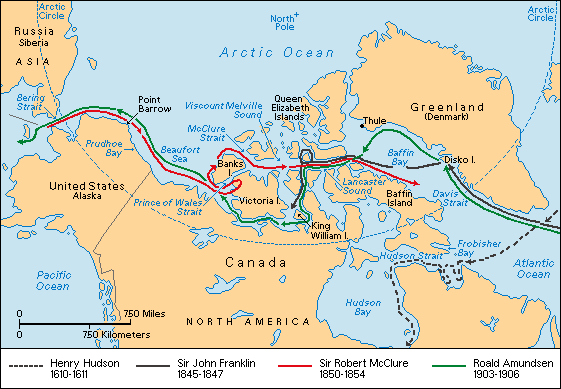September 4-10, 2014 Current Events Lesson Plan
Current Event: Ship Missing in the Arctic Since the 1800’s Found By Divers
Underwater archaeologists recently discovered the wreck of one of two ships from the ill-fated Franklin expedition in the waters of the Arctic Ocean. In 1845, English adventurer Sir John Franklin set out on an expedition to find the Northwest Passage, a northern water route across North America. In September 1846, the ships were trapped by thick sea ice near King William Island. Franklin and several crewmen died there several months later. When no one returned from the voyage, Lady Franklin in 1848 sponsored the first of many expeditions to search for her husband. A full exploration of the Arctic resulted, but the ships and crew were never found. Later, explorers found evidence of Franklin’s party, including a written message left on King William Island in 1848 indicated that 105 surviving crew abandoned the ships that were hopelessly jammed in ice.

This map shows routes traveled by explorers in search of a northern sea passage between Europe and Asia. The English explorer Henry Hudson, sailing for the Dutch East India Company, led an expedition in search of the passage in 1610 and 1611. Other expeditions included those by the British explorers Sir John Franklin (1845-1847) and Sir Robert McClure (1850-1854) and by the Norwegian explorer Roald Amundsen (1903-1906). (World Book map)
Objective:
The Arctic Ocean is the body of water covering Earth’s northernmost regions. The North Pole lies near the center of the Arctic Ocean. The Arctic Ocean is bitterly cold. At its surface, thick chunks of floating ice form a treacherous, shifting landscape. During the winter, the sun does not rise for weeks over the Arctic Ocean. In the summer, the sun remains above the horizon for several weeks, and some of the ice melts. Despite its icy cover, the Arctic Ocean supports a diversity of wildlife. Seals and whales feed on fish and tiny floating organisms called plankton. Some whales eat huge amounts of shrimplike zooplankton called krill. Most of Greenland and parts of Alaska, Canada, Norway, and Russia extend into the Arctic Ocean. The Behind the Headlines news story and related World Book articles explore the Arctic Ocean and other geographical features.
Words to know:
- Archaeology
- Arctic
- Arctic Ocean
- Canada
- Exploration
- Sir John Franklin
- North America
- North Pole
- Northwest Passage
Discussion Topics:
1. Ask your students to name some famous explorers. (Students might say Roald Amundsen, John Cabot, Christopher Columbus, James Cook, Hernán Cortés, Jacques-Yves Cousteau, Vasco Da Gama, Sir Francis Drake, Sylvia Earle, Leif Eriksson, Estevanico, Matthew Henson, Meriwether Lewis and William Clark, Sir Alexander Mackenzie, Ferdinand Magellan, Marco Polo.)
2. The ill-fated Franklin expedition set out in 1845. Ask your students to name some people who were living when Franklin’s expedition set out. (Students might say Susan B. Anthony, Otto von Bismarck, Charles Darwin, Charles Dickens, Frederick Douglass, Geronimo, Robert E. Lee, Abraham Lincoln, Sir John Alexander Macdonald, Karl Marx, Gregor Mendel, Florence Nightingale, Louis Pasteur, Harriet Tubman, Queen Victoria.)
3. Archaeologists work in many places including Egypt, Greece, the Middle East, North America, and even underwater. Ask your students, “If you could be an archaeologist, where would you want to work? Why?
4. Ask your students to use World Book’s Timelines feature to view or add to the Exploring the World timeline. (Students may wish to use World Book’s Exploration article for help.)


